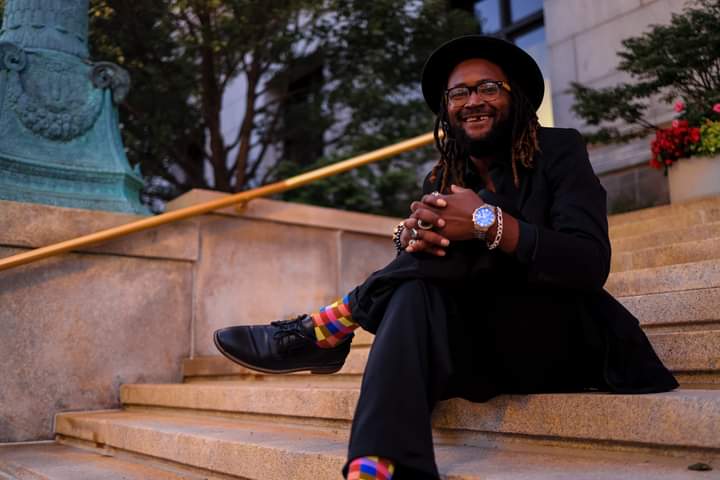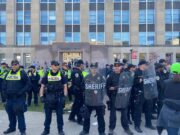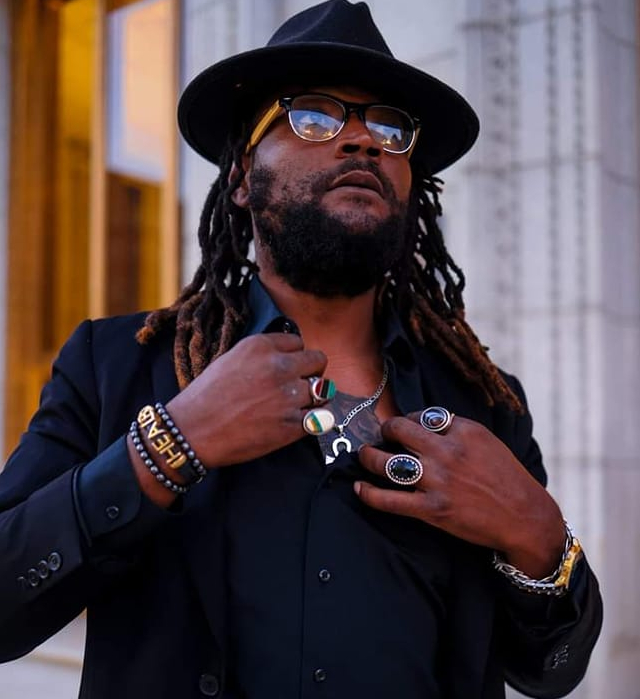Ajamou Butler is no stranger to putting in the work to find what needs to be done, and manifesting it into reality. This is most evidenced by Heal the Hood Milwaukee, an organization that Butler started in 2012 and recently had its 11th annual block party this past May. While Heal the Hood serves as a path towards aiding and supporting the community for Butler, his own efforts do not stop there.
At 32 years old, Butler has already been to far more places than he would have expected 10 years ago. From South Africa, to Jamaica, to Panama, and most recently Belize, experiences internationally have started to shift Butler’s perspective on where he plans to take Heal the Hood as a concept more than just an organization.
Spending three weeks this past September in Belize, residing and working within a community with little resources and accessibility to everyday conveniences, Butler discussed how it is the aspect of being within real authentic communities doing community work that fulfills him on his travels instead of the usual tourist experience.
“It was a different type of heat down there in Belize, but I felt so refreshed,” Butler told Madison365. “I felt so honored to go and just simply serve, then I plan on going back, too, so I need them to know my name and face and see this Heal the Hood logo on my shirt. I need them to know about this thing. Belize is what’s given us a different projection for the future. When we started Heal the Hood back in 2012, we weren’t thinking about overseas and children’s books or being here 10 years, and you damn near don’t ever think about that stuff. Some of us come from an environment where we’re supposed to say, ‘Thank God it’s Friday.’”

(Photo supplied.)
Butler’s reframing of what Heal the Hood means as an approach to community uplift has been in development over the past few years of travel overseas, and being present in schools, churches, prisons, and other everyday spaces in Belize gave him insight into what Heal the Hood means for them. One thing Butler was sure to bring with him was his African drum which he used to spark energy at a local high school and inspire sharing of Belizean music and dancing, speaking to the African ancestry in Belize.
However, it was at a local prison sharing drumming and reflections with inmates that Butler was truly struck by an unexpected connection. Among the 250 to 300 inmates Butler spoke to was one inmate who stood up to share their experience growing up in Milwaukee … not far from where Butler himself grew up in the city. Sharing streets, neighborhoods, and attending the same school, although at different times, gave an entirely new outlook on where different paths can lead, even when beginning from similar starting points.
“God, what are you saying to me right now?” asked Butler of the situation that could not be a coincidence. “I’m on the right path and I’m still stuck trying to figure out what that moment means to me. Ain’t no way on earth I’m going to Belize, all overseas, and just run into this brother from the block who’s got some of the same experiences if we really had a conversation about Milwaukee living. I would imagine there’s gonna be some similarities and stories, and we’re here in the same place for two totally different reasons.”
While Milwaukee certainly has its own struggles that Butler shows the utmost passion for, being in communities in Belize without running water and electricity as a widespread amenity showed the difference in needs and privileges between the two communities. With that in mind, questions for Butler started forming around what it looks like to Heal the Hood in other localities, and to address unique problems.
One aspect of community empowerment Butler consistently found throughout his travels, however, was education. From there, it was time to rethink how we communicate the need for education, as well as how it is then put into practice in our communities back home.
“My question has now become to myself and to my fellow educators around me: how do we bridge that type of gap?” Butler pondered. “How do we bridge that type of gap with our babies here? How do we revolutionize their thinking on what it means to read a book, what it means to educate yourself, what it means to learn emotional control, and what it means to deal with discipline and all of these types of things? Learn a martial art, learn how to write poetry, learn how to play an instrument, and not steal, not argue with somebody about what’s better between an iPhone or Android, or Jordans or Adidas. I’m not talking down on our babies because I love my ghetto babies, and if you know it, you know it, but we do have some growth areas we need to massage and stimulate.”
Perhaps what drives Butler the most are his own past experiences struggling economically and emotionally growing up in Milwaukee, and carrying those struggles with him to UW-Green Bay before he dropped out and turned his life around after moving back to Milwaukee and having a son. Issues with depression, addiction, and hopelessness in the past now serve as a testament for Butler that has propelled him to a place where he has been out to the Green Bay area more than a dozen times over the last few years for speaking and community building.

(Photo supplied.)
The Green Bay area is not the only area Butler would like to see healing in though, as the movement has started to catch on with others.
“We want to start to really figure out what it looks like to chapter this thing, and build financial capacity and man and woman power capacity to say, ‘Someone in Madison wants to do a Heal the Hood.’ It may look different because the problems in Madison might be different from Milwaukee. I’ve got people in Mississippi who have launched a Heal the Hood,” said Butler who mentioned how organizers in places like Mississippi and Flint, Michigan, have reached out to produce their own Heal the Hood events and community efforts.
“We’ve got resources here through the organization that we can start to really build up and build out, and go do some global impact work while still not neglecting what we’re doing here. Now we’re talking on a different level. One of the things we’re about to implement with our Heal the Hood board is it’s going to be an all-women-of-color board. We’re talking about a different level of strategy and empowerment.”
While Butler discussed plans on possibly relocating to North Carolina and carrying the work down there, he was positive that the love he has received across Wisconsin will continue to be reciprocated as he discussed the importance of empowering others to do this same work to draw people together and organize them for a greater cause.
One important piece of the puzzle for Butler that he keeps in mind is that one approach does not work across every area or community, and often even across the individuals within that community. Working with young people at Vel R. Phillips Youth & Family Justice Center grounds Butler in his work of learning before attempting to heal. By listening to many stories that he can relate to through his own, as well as many where solutions would be unimaginable for any adult, Butler makes it a point to affirm experiences that lead these young people into the justice system while also affirming their capabilities to prevent their return into that system.
“I was telling the young brothers, ‘I’m gonna be gone for three weeks and I won’t see y’all awhile, but when I come back, the transformation gonna look different,’” Butler recalled telling the young men at Vel R. Phillips. “When I came back, I brought some money from Belize, from Panama, from South Africa, and some Jamaican money with me. I showed it to them and said, ‘My young brothers, this means I’m a global man. This means I’ll never die on the block. This means I put blood, sweat, and tears in places that most people never go to see.’ That blew their minds, so now my curriculum that I’m pushing since I’ve been back is this presentation I do called ‘From the Block to the Globe.’”
By modeling a way out after his own life and pushing those who may be on the verge of giving up to see what trying again can bring them in the right context among supportive networks, Butler looks to disrupt the pervasive idea that circumstances and personal history mean change cannot happen.
Disrupting that idea cannot happen without first understanding what people need. That is the new focus for Butler as he looks towards what expanding Heal the Hood looks like both as an organization and as a concept that other community organizers around the world can bring to their localities to specifically address their community ills that need healing. By partnering with and bringing in people who genuinely want to make an impact, Butler knows that the vision and mission of Heal the Hood will live on through individual passion and commitment to the unique challenges different communities face.
“When you go into situations, and you’re trying to work with the demographic we come to serve about teaching and preaching, it’s truly about empowering. Let me just observe what we got going on and give you a couple of tools and resources. I believe you can do this so go ahead and just knock it on out. For so long, we’ve had a very small team with Heal the Hood,” said Butler, who looks forward to expanding other’s capacity to join and collaborate around Heal the Hood for their own communities.
“Now that we are about to relaunch, we have to duplicate. We do such amazing things, and we have to train people to duplicate communal empowerment. People who can go in the jails and do what I do, and talk to kids with this certain perspective to start teaching and preaching … it’s next-level stuff.”
Butler closed on an idea that he shares with the young men he often works with in that he is glad that his journey did not end during those struggles in his younger days, and that not giving up on yourself is the most important part of pushing forward.
To learn more about Heal the Hood or find ways to get involved and support the organization, visit their website here.




























